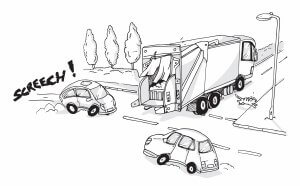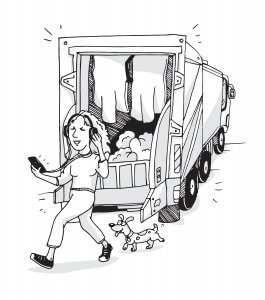The driver shortage is causing an even more acute lack of experienced supervisors. Is this affecting safety standards?
Waste and recycling has a long-standing safety problem. It’s amongst the most dangerous industries to work in, and in the collection environment it is not only workers at risk but the general public too.

Most of the councils and companies I regularly work with have made great strides to improve safety. Crew and public safety is always a key feature in discussions I have with councils about implementing new working practices or route designs. Health and safety is more prominent now than at any time in my 20 years working in the waste industry.
In particular, there is excellent guidance available the Health and Safety Executive and from WISH at https://www.wishforum.org.uk/wish-guidance, much of which has been updated frequently during the Covid-19 pandemic. Councils are making great efforts to work to this guidance and build a culture of safety.
Recently though, supervisors are increasingly being called upon to drive trucks to keep services running. With empty desks in the depot office the difficulties of managing safety standards are obvious.
It is important for collection crews to have well-maintained street-level risk assessments for domestic collections and site-specific ones for commercial jobs. These must be done systematically and consistently. It is crucial that crews and the public can contribute to these assessments – highways can change enormously at different times of day, as the weather changes and with each season. Crews must trust that their managers will act on information received to mitigate risks.

Risk assessments should lead to reasonable actions to mitigate hazards. There is of course a lot of informed judgement required, to balance the operational needs with the likelihood and potential severity of harm. The risk assessment process has to be consistent if it is to be credible and respected. This consistency may be harder to achieve if the assessments are made piecemeal as and when resources allow.
In my experience these audits seem to be most commonly carried out on spreadsheets. This is a convenient way to get started but typically doesn’t integrate well with other systems. It’s difficult to be sure you’ve covered all the streets and premises your crews work in, especially for commercial routes which change frequently. The results of each risk assessment don’t automatically get published anywhere else and crucial safety information may not ever be given to crews or updated as risks change.
Having a detailed safety plan backed up by policies and staff training is a great start to compliance, but employers must also have robust processes in place to ensure that they are being carried out.
Councils typically carry out periodic assessment of their crews. They check that crews are working in compliance with the risk assessments, following best practice and adhering to council policy in their daily work. This covers basic things such as wearing the correct PPE and avoiding horseplay, but also more specific hazards such as standing clear of bins being lifted and carrying out vehicle manoeuvres such as reverses in the correct manner. Of course to assess these things you have to be able to see the crews at work and ensure that what you see is representative of how they really work.

With mounting pressure on waste teams from tight budgets, the pandemic and now driver shortages it’s very difficult for team leaders and service managers to prioritise these activities. In recent weeks supervisors have often been called upon to drive vehicles simply to keep services afloat. It is understandable and perhaps inevitable that routine tasks such as audits end up taking a back seat.
Whatever the methodology, managers need to be able to clearly evidence that regular, consistent monitoring is in place and is acted upon. Above all, they must show that safety standards are maintained and improving.
Councils must, therefore, find new ways to keep safety at the top of the agenda, using technology and new ways of working to get the most from their limited resources. On-board video systems and modern telematics have an important role to play here, but on their own they add complexity to an already fragmented process.
Waste teams, at all levels, need an integrated approach to managing safe working, bringing together route design, risk assessment, monitoring and training into a single environment. Only then will they have a consistent process that benefits everyone.
3500 front-line crews use our products every day. How could our systems help you?
We want to help you do better
We’re here to help you towards a better future with a happier public.
industry updates and news
Keep up to date with the waste collection industry and discover expert insights from our team.
Portsmouth City Council bring waste and recycling service in-house
Tim Hobbs
Apr 12, 2024 • 26 sec read
Are garden waste stickers necessary if you have in-cab waste technology?
Tim Hobbs
Jan 9, 2024 • 2 min read
Missed bins are a negative experience for everyone, but it doesn't have to be that way.
Tim Hobbs
Dec 17, 2023 • 4 min read